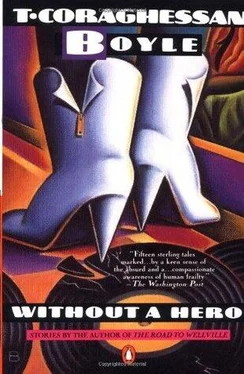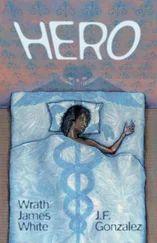T. Boyle - Without a Hero
Здесь есть возможность читать онлайн «T. Boyle - Without a Hero» весь текст электронной книги совершенно бесплатно (целиком полную версию без сокращений). В некоторых случаях можно слушать аудио, скачать через торрент в формате fb2 и присутствует краткое содержание. Год выпуска: 1995, Издательство: Penguin Books, Жанр: Современная проза, на английском языке. Описание произведения, (предисловие) а так же отзывы посетителей доступны на портале библиотеки ЛибКат.
- Название:Without a Hero
- Автор:
- Издательство:Penguin Books
- Жанр:
- Год:1995
- ISBN:нет данных
- Рейтинг книги:3 / 5. Голосов: 1
-
Избранное:Добавить в избранное
- Отзывы:
-
Ваша оценка:
- 60
- 1
- 2
- 3
- 4
- 5
Without a Hero: краткое содержание, описание и аннотация
Предлагаем к чтению аннотацию, описание, краткое содержание или предисловие (зависит от того, что написал сам автор книги «Without a Hero»). Если вы не нашли необходимую информацию о книге — напишите в комментариях, мы постараемся отыскать её.
Greasy Lake
People
Without a Hero
The Philadelphia Inquirer
Without a Hero — читать онлайн бесплатно полную книгу (весь текст) целиком
Ниже представлен текст книги, разбитый по страницам. Система сохранения места последней прочитанной страницы, позволяет с удобством читать онлайн бесплатно книгу «Without a Hero», без необходимости каждый раз заново искать на чём Вы остановились. Поставьте закладку, и сможете в любой момент перейти на страницу, на которой закончили чтение.
Интервал:
Закладка:
Casper rose to his feet. I heard him fumbling with his cardboard carton of eggs. We didn’t speak — speech would have been superfluous. I rose too. My eggs, palpable, smooth, fit the palm of my hand as if they’d been designed for it. I raised my arm — baseball, football, basketball — and Casper stirred beside me. The familiar motion, the rush of air: I will never forget the sound of that first egg loosing itself against the front of the house, a wetness there, a softness, the birth of something. No weapon, but a weapon all the same.
The summer sustained me. Hot, unfettered, endless. On the first day of vacation I perched in an apple tree at the end of the cul-de-sac that bordered the development and contemplated the expanse of time and pleasure before me, and then it was fall and I was in junior high. Maki Duryea had moved. I’d heard as much from Casper, and one afternoon, at the end of summer, I hiked up that long rutted dirt road to investigate. The house stood empty. I climbed the ridge behind it to peer in through the naked windows and make sure. Bare floors stretched to bare walls.
And then, in the confusion of the big parking lot at the junior high where fifty buses deposited the graduates of a dozen elementary schools, where I felt lost and out of place and shackled in a plaid long-sleeved shirt new that morning from the plastic wrapping, I saw her. She sprang down from another bus in a cascade of churning legs and arms and anxious faces, a bookbag slung over one shoulder, hair ironed to her waist. I couldn’t move. She looked up then and saw me and she smiled. Then she was gone.
That night, as I slapped a hard black ball against the side of the house, thinking nothing, I caught a faint electrifying whiff of a forgotten scent on the air, and there he was, the fog man, rattling by the house in his open jeep. My bike lay waiting at the curb and my first impulse was to leap for it, but I held off. There was something different here, something I couldn’t quite place at first. And then I saw what it was: the fog man was wearing a mask, a gas mask, the sort of thing you saw in war movies. He’d collected the usual escort of knee-pumping neighborhood kids by the time he’d made his second pass down the street in front of our house, and I’d moved to the curb now to study this phenomenon, this subtle alteration in the texture of things. He looked different in the mask, sinister somehow, and his eyes seemed to glitter.
The fog obliterated the houses across from me, the wheeling children vanished, the low black roiling clouds melted toward me across the perfect sweep of the lawn. And then, before I knew what I was doing, I was on my bike with the rest of them, chasing the fog man through the mist, chasing him as if my life depended on it.
SITTING ON TOP OF THE WORLD
PEOPLE WOULD ASK HER what it was like. She’d watch them from her tower as they weaved along the trail in their baseball caps and day packs, their shorts, hiking boots and sneakers. The brave ones would mount the hundred and fifty wooden steps hammered into the face of the mountain to stand at the high-flown railing of the little glass-walled shack she called home for seven months a year. Sweating, sucking at canteens and bota bags, heaving for breath in the undernourished air, they would ask her what it was like. “Beautiful,” she would say. “Peaceful.”
But that didn’t begin to express it. It was like floating untethered, drifting with the clouds, like being cupped in the hands of God. Nine thousand feet up, she could see the distant hazy rim of the world, she could see Mount Whitney rising up above the crenellations of the Sierra, she could see stars that haven’t been discovered yet. In the morning, she was the first to watch the sun emerge from the hills to the east, and in the evening, when it was dark beneath her, the valleys and ridges gripped by the insinuating fingers of the night, she was the last to see it set. There was the wind in the trees, the murmur of the infinite needles soughing in the uncountable branches of the pines, sequoias and cedars that stretched out below her like a carpet. There was daybreak. There was the stillness of 3:00 A.M. She couldn’t explain it. She was sitting on top of the world.
Don’t you get lonely up here? they’d ask. Don’t you get a little stir-crazy?
And how to explain that? Yes, she did, of course she did, but it didn’t matter. Todd was up here with her in the summer, one week on, one week off, and then the question was meaningless. But in September he went back to the valley, to his father, to school, and the world began to drag round its tired old axis. The hikers stopped coming then too. At the height of summer, on a weekend, she’d see as many as thirty or forty in the course of a day, but now, with the fall coming on, they left her to herself — sometimes she’d go for days without seeing a soul.
But that was the point, wasn’t it?
She was making breakfast — a real breakfast for a change, ham and eggs from the propane refrigerator, fresh-dripped coffee and toast — when she spotted him working his way along one of the switchbacks below. She was immediately annoyed. It wasn’t even seven yet and the sign at the trailhead quite plainly stated that visitors were welcome at the lookout between the hours of ten and five only . What was wrong with this guy — did he think he was exempt or something? She calmed herself: maybe he was only crossing the trail. Deer season had opened — she’d been hearing the distant muted pop of gunfire all week — and maybe he was only a hunter tracking a deer.
No such luck. When she glanced down again, flipping her eggs, peering across the face of the granite peak and the steep snaking trail that clung to it, she saw that he was coming up to the tower. Damn, she thought, and then the kettle began to hoot and her stomach clenched. Breakfast was ruined. Now there’d be some stranger gawking over her shoulder and making the usual banal comments as she ate. To them it might have been like Disneyland or something up here, but this was her home, she lived here. How would they like it if she showed up on their doorstep at seven o’clock in the morning?
She was eating, her back to the glass door, hoping he’d go away, slip over the lip of the precipice and disappear, vanish in a puff of smoke, when she felt his footfall on the trembling catwalk that ran round the outside of the tower. Still, she didn’t turn or look up. She was reading — she went through a truckload of books in the course of a season — and she never lifted her eyes from the page. He could gawk round the catwalk, peer through the telescope and hustle himself back on down the steps for all she cared. She wasn’t a tour guide. Her job was to watch for smoke, twenty-four hours a day, and to be cordial — if she was in the mood and had the time — to the hikers who made the sweaty panting trek in from the trailhead to join her for a brief moment atop the world. There was no law that said she had to let them in the shack or show them the radio and her plotting equipment and deliver the standard lecture on how it all worked. Especially at seven in the morning. To hell with him, she thought, and she forked up egg and tried to concentrate on her book.
The problem was, she’d trained herself to look up from what she was doing and scan the horizon every thirty seconds or so, day or night, except when she was asleep, and it had become a reflex. She glanced up, and there he was. It gave her a shock. He’d gone round the catwalk to the far side and he was standing right in front of her, grinning and holding something up to the window. Flowers, wildflowers, she registered that, but then his face came into focus and she felt something go slack in her: she knew him. He’d been here before.
Читать дальшеИнтервал:
Закладка:
Похожие книги на «Without a Hero»
Представляем Вашему вниманию похожие книги на «Without a Hero» списком для выбора. Мы отобрали схожую по названию и смыслу литературу в надежде предоставить читателям больше вариантов отыскать новые, интересные, ещё непрочитанные произведения.
Обсуждение, отзывы о книге «Without a Hero» и просто собственные мнения читателей. Оставьте ваши комментарии, напишите, что Вы думаете о произведении, его смысле или главных героях. Укажите что конкретно понравилось, а что нет, и почему Вы так считаете.











